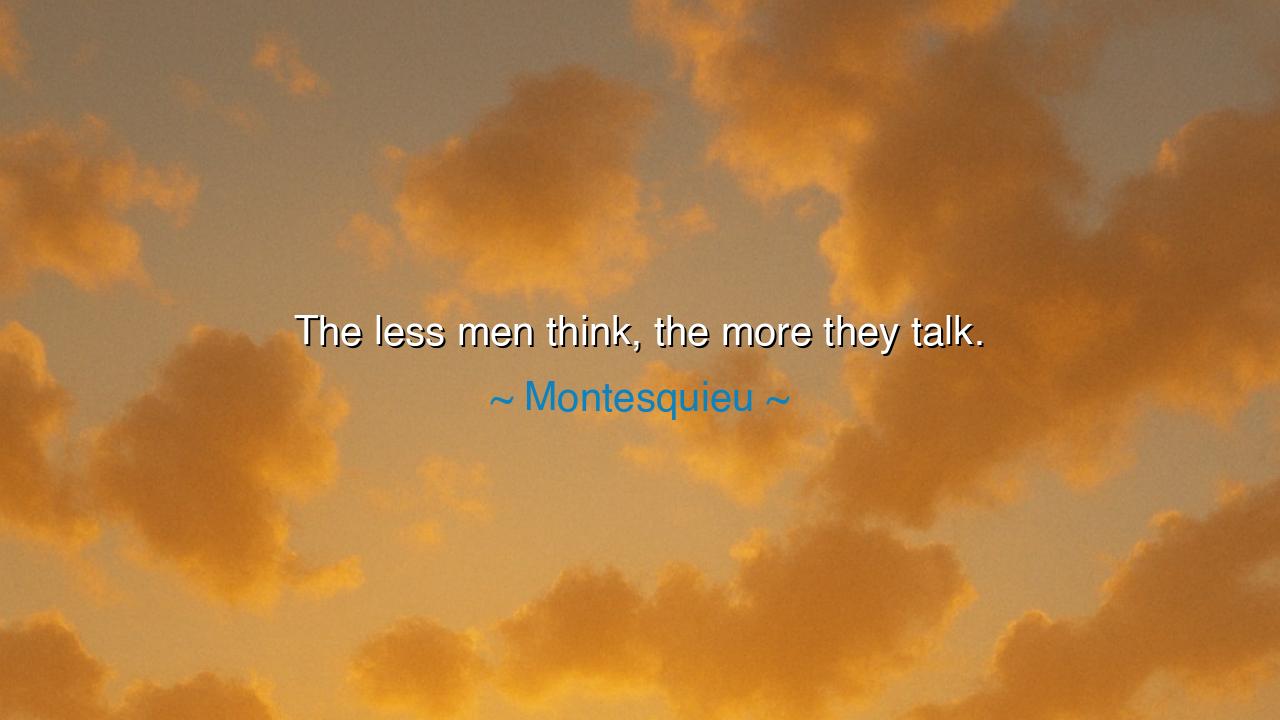
The less men think, the more they talk.






When Montesquieu declared, “The less men think, the more they talk,” he was not simply criticizing idle chatter — he was exposing one of the great ironies of human nature. In these few words, the French philosopher revealed how silence is the companion of wisdom, and noise the cloak of ignorance. His insight, born from a lifetime of observation and reflection, cuts to the core of human vanity: that those who lack understanding often seek to disguise it beneath a flood of words. In contrast, the wise, who see deeply into the heart of things, speak little — for they know that truth is vast, and words can only ever grasp at its surface.
Montesquieu, author of The Spirit of the Laws, lived in the age of reason — a time when thought was the highest virtue, and speech was to be measured, deliberate, and purposeful. His world, like ours, was filled with men who loved to speak but hated to think. He saw in their endless debates and shallow rhetoric a kind of mental emptiness disguised as eloquence. To him, the great tragedy of human discourse was that the more one speaks without thinking, the more one drives truth away. For thought requires silence, and silence is something the vain and foolish cannot endure.
The ancients understood this long before Montesquieu. Socrates, the father of philosophy, taught by asking questions, not by giving speeches. His wisdom was drawn not from the abundance of his words, but from the clarity of his thought. He once said, “The only true wisdom is in knowing you know nothing.” Yet, how many men — then and now — speak as though they know everything? The more ignorant the soul, the louder it seeks to be heard, mistaking volume for virtue and chatter for knowledge. Thus, Montesquieu’s aphorism stands as a timeless warning: when thought is absent, speech becomes a form of vanity, a mirror in which fools admire themselves.
History offers countless examples of this truth. Consider the fall of Athens after the Peloponnesian War. The city that once produced philosophers and poets had, in its decline, become a city of talkers — demagogues who stirred the mob with empty rhetoric. Men like Cleon, who spoke loudly and promised much, drowned out the thoughtful voices of moderation. The more they talked, the less they listened; the less they listened, the less they thought. Athens, the cradle of reason, was undone by its own endless noise. It is a lesson that repeats across ages: civilizations perish not because of silence, but because wisdom is buried under the chatter of fools.
Yet, Montesquieu’s observation is not a condemnation of speech itself, but of thoughtless speech. Words have the power to build or to destroy, to heal or to deceive. The problem lies not in the voice, but in the mind behind it. A man who thinks before he speaks gives life to wisdom; a man who speaks before he thinks gives birth to confusion. The tongue, said the ancients, is both sword and flame — capable of cutting through falsehood or setting the world ablaze with folly. To master it, one must first master one’s thoughts.
Let us remember also that silence is not weakness. It is the space in which ideas are born, and truth takes form. The wise do not fear silence because they are not enslaved by the need to be heard. They speak only when their words are better than their silence. Consider Abraham Lincoln, who in moments of great crisis often sat in quiet reflection before addressing his nation. His speeches were few but immortal, not because he spoke much, but because he thought deeply. His words carried weight because they came from stillness — a stillness that lesser men, driven by vanity or fear, could never understand.
The lesson, then, is simple but sacred: think before you speak, and value silence as the forge of wisdom. Resist the temptation to fill the air with sound merely to prove your worth. Ask yourself, “Do my words add light, or do they add noise?” For in every conversation, every debate, every moment of choice, the thoughtful word builds and the careless one destroys.
So, O seeker of truth, remember Montesquieu’s warning. Let your speech be slow, your thought deep, and your silence deliberate. Speak not to impress, but to enlighten. For in the end, the measure of a man is not in how much he talks, but in how much he understands. The wise are remembered for the weight of their thoughts, while the foolish are forgotten beneath the echo of their noise.






AAdministratorAdministrator
Welcome, honored guests. Please leave a comment, we will respond soon